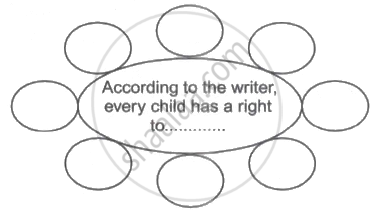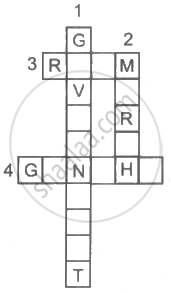Advertisements
Advertisements
प्रश्न
Name the following.
So called daughters of Kailash Satyarthi - _________.
उत्तर
So-called daughters of Kailash Satyarthi - Malala, two Kayanats, and Shazia
APPEARS IN
संबंधित प्रश्न
Put a ✓or ×.
A good speech delivered requires the following characteristics.
Well planned and thoughts well-organized.
Put a ✓or ×.
A good speech delivered requires the following characteristics.
Language used should be suitable for the audience.
Put a ✓or ×.
A good speech delivered requires the following characteristics.
The speech should be of proper duration.
Think and give your own response.
Besides the political freedom that our nation enjoys, what other freedom should it strive for? Say why.
What will you do in the following situation?
If you see a child working in a restaurant.
What will you do in the following situation?
If you find a child working at a construction site.
The persons to whom Kailash Satyarthi gives the highest credit of his honour -
Read the passage carefully and complete the activities:
1. Complete the following sentences. (2)
- Let us march from ignorance ______.
- Kailash Satyarthi says that today he sees thousands of ______.
- Close your eyes and feel ______.
- Let us universalise ______.
2. Complete the following web. (2)

|
TODAY, beyond the darkness, I see the smiling faces of our children in the blinking stars. TODAY, in every wave of every ocean, I see my children are playing and dancing. TODAY, in every plant, in every tree, and mountain, I see our children growing freely with dignity. Friends, I want you to see and feel this TODAY inside you. I am sure you can - Now, listen to that child. Listen, please. |
3. Write the noun forms of the following from the passage. (2)
- dark - ______
- exploit - ______
- educate - ______
- ignore - ______
4. Do as directed. (2)
- Let us democratise knowledge. (choose the correct question tag and rewrite the sentence using it)
a) will you?
b) shall we?
c) Isn’t it?
d) wasn’t it? - May I please request you to put your hand close to your heart?
(underline the ‘infinitive’)
5. Personal Response: (2)
What does honourable Kailash Satyarthi suggest us to do?
Read the following passage and do the activities.
A1. Complete the following web with the help of the passage.

A2. Who said to whom?
- "Why is he not with us in the school ?"
- "Sir, I have never thought about it. We are born to work."
|
Friends, we can do this. Governments must make child-friendly policies, and invest in education and young people. Businesses must be more responsible, accountable and open to innovative partnerships. Intergovernmental agencies must work together to accelerate action. Global civil society must rise above the business-as-usual and fragmented agendas. Faith leaders and institutions, and all of us must stand with our children. We must be bold, we must be ambitious and we must have the will. We must keep our promises. |
A3. Solve the crossword puzzle using words from passage referring to the clues given below:

| Down: | Across: |
| 1. of the people, by the people, for the people |
3. A place to rest |
| 2. To move forward | 4. Father of our nation |
A4. Do as directed:
(i) I see the smiling faces of our children in the blinking stars.
(Begin the sentence with "The smiling faces ..............)
(ii) His answer made me angry.
(Begin the sentence with "I...............)
A5. "Let us march from darkness to light" - Elaborate.
Read the following passage and do the activities:
B1. Who said to whom? (2)
| Sentence | Who said | To whom | |
| i. | Is the world so poor that it cannot give me a toy and a book? | ||
| ii. | What is my fault? |
|
Twenty years ago, in the foothills of the Himalayas, I met a small, skinny child labourer. He asked me : “Is the world so poor that it cannot give me a toy and a book instead of forcing me to take a gun or a tool?” I met with a Sudanese child soldier. He was kidnapped by an extremist militia. As his first training lesson, he was forced to kill his friends and family. He asked me: “What is my fault?” Friends, all the great religions teach us to care for our children. Jesus said: “Let the children come to me; do not hinder them, for the kingdom of God belongs to them.” The Holy Quran says: “Kill not your children because of poverty.” Friends! There is no greater violence than to deny the dreams of our children. Therefore ... I refuse to accept that all the temples and mosques and churches and prayer houses have no place for the dreams of our children. I refuse to accept that the world is so poor, when just one week of global military expenditure can bring all the children to classrooms. |
B2. Complete the web: (2)

B3. Write the describing words for the following from the passage: (2)
| i. | ____________ | Week |
| ii. | ____________ | Quaran |
| iii. | ____________ | Violence |
| iv. | ____________ | religions |
B4. Do as Directed: (2)
- He asked me, “What is my fault?” (Choose the correct indirect speech from the following)
- He asked me what is his fault.
- He asked me what was his fault.
- He asked me what his fault is.
- He asked me what his fault was.
- He was forced to kill his friends and family.
(Rewrite the sentence and underline the infinitive)
B5. Personal Response: (2)
What will you do if you find a poor and needy child? Explain.
